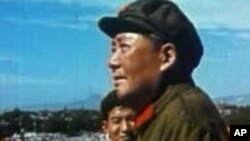China has a lot to celebrate as it marks the 60th anniversary of communist rule. Since the People's Republic was founded in 1949, it has transformed itself from an impoverished, war-torn nation to an economic and diplomatic powerhouse. But when it comes to human rights, the country has far to go, say key Chinese dissidents speaking in Washington.
It was dubbed the Campaign of 100 Flowers. The 1950's movement was meant to encourage free expression, and the iconic Mao Zedong was at its head.
It sounded promising to Harry Wu, at the time a young geology student. He shared his thoughts and was promptly sent to a labor camp where he spent 19 years - like countless others, punished for being a traitor to the communist way of life.
Wu now lives in the Washington D.C. area, and has just written a book on Chinese prison labor camps. He told members of Congress that the U.S. regularly imports products made in these camps.
"The law does not allow us to import any forced labor products. So I hope the Congress can really put pressure on the Obama Administration. We have to enforce the law," he said.
Chinese human rights activists Wei Jingsheng and Shen Ting joined Wu on Capitol Hill. They hoped to call attention to human rights which they feel are off the international agenda as China celebrates 60 years of communist rule.
Wei Jingsheng also spent two decades in a Chinese prison. He says Chinese workers have no rights and he does not expect them to accept that much longer.
"I must emphasize that various resistance activities by the people are getting stronger and stronger," he said.
Meantime, in Shanghai, where activist Shen Ting was born and raised, she says residents are being forcibly displaced in the name of development.
"Corruption is rampant and peoples' private property is being taken off," she noted.
The Chinese government says human rights should include economic prosperity which brings a better standard of living. Beijing says it has made great strides here.
Wu, now 72, believes the Chinese people will eventually cast off communism as citizens in the Soviet Union did.
"The Soviet communist party was not dismissed by an American president," he said.








